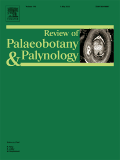
REVIEW OF PALAEOBOTANY AND PALYNOLOGY
Scope & Guideline
Illuminating the Secrets of Ancient Ecosystems
Introduction
Aims and Scopes
- Palaeobotany:
The journal emphasizes the study of ancient plants and their evolutionary history, including the morphology, anatomy, and taxonomy of fossilized plant remains. - Palynology:
A core focus of the journal is the analysis of pollen and spores, which are critical for reconstructing past climates, environments, and biogeographic patterns. - Climate and Environmental Change:
Research often addresses how ancient vegetation responded to climatic shifts, providing insights into historical ecological dynamics and informing current climate change discussions. - Biogeography and Phylogeny:
The journal contributes to understanding plant distribution patterns over geological timescales, including the evolution and dispersal of plant lineages across different regions. - Anthropogenic Impacts:
Increasingly, the journal includes studies examining the historical impact of human activities on vegetation and ecosystems, linking past and present ecological challenges.
Trending and Emerging
- Interdisciplinary Approaches:
There is a growing trend towards integrating various scientific disciplines, such as geochemistry, archaeology, and climate science, to create a more holistic understanding of palaeobotanical issues. - Climate Change Research:
Many recent articles are focused on how ancient vegetation responded to climate changes, linking past events to current climate dynamics and providing valuable insights into potential future scenarios. - Paleoecological Reconstructions:
The journal increasingly emphasizes paleoecological studies that utilize pollen data to reconstruct ancient environments, enhancing our understanding of ecosystem dynamics over time. - Technological Advances in Analysis:
Emerging themes include the use of advanced imaging techniques and molecular methods in palynology, allowing for more precise identifications and insights into ancient plant life. - Anthropogenic Influence on Vegetation:
There is a notable increase in studies exploring the impact of human activities on historical vegetation patterns, reflecting a modern concern for sustainability and conservation.
Declining or Waning
- Traditional Taxonomy:
There seems to be a decline in purely taxonomic studies that do not integrate ecological or environmental data, as researchers increasingly focus on broader ecological implications. - Single-Species Studies:
Research centered on individual species without contextual environmental data is becoming less common, with a shift toward more integrative approaches that consider ecological interactions and climate influence. - Local Case Studies:
There is a noticeable decrease in studies that focus solely on localized fossil findings without broader implications for global palaeobotanical trends or climate change discussions.
Similar Journals
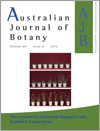
AUSTRALIAN JOURNAL OF BOTANY
Unveiling ecological interactions through rigorous research.The Australian Journal of Botany is a prestigious peer-reviewed journal published by CSIRO PUBLISHING, dedicated to advancing the field of plant sciences and ecology. Established in 1953, this journal provides a critical platform for researchers to share original research findings, reviews, and perspectives in subjects ranging from plant biology to ecological interactions, with a focus on Australian flora and its conservation. With an impressive impact factor and categorized in the Q3 quartile in both Ecology, Evolution, Behavior and Systematics and Plant Science, the journal ranks competitively within its fields, allowing authors to reach a diverse audience of professionals, students, and fellow researchers. The journal is accessible in print and electronically through its ISSN: 0067-1924 and E-ISSN: 1444-9862, providing wider access to vital research outcomes that influence environmental policies and natural resource management. As it aspires towards innovation and excellence, the Australian Journal of Botany remains an essential resource for those passionate about the richness of plant biodiversity and ecological understanding.

Acta Botanica Mexicana
Advancing ecological knowledge through innovative research.Acta Botanica Mexicana is a premier journal published by Instituto de Ecología AC, dedicated to advancing research in the fields of ecology, plant science, and biological sciences. With an E-ISSN of 2448-7589, this open-access journal facilitates extensive dissemination of scientific findings, ensuring that knowledge is accessible to researchers, professionals, and students worldwide. Established in 2008, Acta Botanica Mexicana has earned a notable reputation, achieving a Q3 ranking in plant science and a Q4 ranking in ecology and evolution for 2023. This positioning underscores its commitment to publishing high-quality research that addresses vital issues in ecological and botanical studies. With a focus on innovative methodologies and pragmatic solutions, the journal invites contributors to share their insights and findings, thus enriching the academic landscape and fostering collaborations that drive the field forward. The journal is based in Michoacán, Mexico, and serves as a key hub for researchers engaging with the challenges and intricacies of plant and ecological studies.

NEW ZEALAND JOURNAL OF BOTANY
Unraveling Nature's Mysteries, One Study at a TimeThe New Zealand Journal of Botany, published by the esteemed Taylor & Francis Ltd, serves as a pivotal platform for disseminating significant research in the fields of Ecology, Evolution, Behavior and Systematics, as well as Plant Science. With a rich history dating back to 1963 and an impressive convergence extending to 2024, this journal has established itself as an essential resource for researchers and professionals dedicated to understanding the complexities of plant life and ecological systems in New Zealand and beyond. The journal is currently categorized in the Q3 quartile for both relevant disciplines as of 2023, reflecting its balanced influence within the global academic community. Although not an open access journal, it retains a significant impact factor, evidenced by its Scopus rankings, which place it within the top half of its categories. This makes it an invaluable tool for students, researchers, and academics aiming to engage with robust, peer-reviewed scientific findings and contribute to the evolving discourse surrounding botany and ecological research.
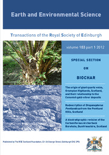
Earth and Environmental Science Transactions of the Royal Society of Edinburgh
Exploring the intricate connections of Earth and environment.Earth and Environmental Science Transactions of the Royal Society of Edinburgh is a prestigious journal published by Cambridge University Press, dedicated to advancing research in the field of Earth and planetary sciences, as well as environmental science. With its ISSN 1755-6910 and E-ISSN 1755-6929, the journal has established itself as a crucial platform for disseminating innovative research and comprehensive reviews since its inception in 2007. Positioned in the Q3 quartile for both Earth and Planetary Sciences and Environmental Science, it contributes significantly to the ongoing dialogue and development in these areas, boasting a Scopus ranking that reflects its commitment to scholarly excellence with an emphasis on interdisciplinary approaches and real-world applications. The journal is based in the United Kingdom, with its editorial office located at the Edinburgh Building, Shaftesbury Road, Cambridge. As an essential resource for researchers, professionals, and students alike, Earth and Environmental Science Transactions offers opportunities for open discourse on pressing environmental challenges, fortifying its role in fostering a deeper understanding of our planet's systems and their interconnectedness.

NORDIC JOURNAL OF BOTANY
Cultivating Knowledge in Plant Science and EcologyNORDIC JOURNAL OF BOTANY, published by WILEY, is a distinguished journal that serves as a vital platform for the dissemination of innovative research in the fields of Plant Science and Ecology, Evolution, Behavior and Systematics. With an ISSN of 0107-055X and E-ISSN 1756-1051, this journal has been a crucial part of the academic landscape since its inception in 1981, continuing to contribute significantly to the literature up to 2024. NORDIC JOURNAL OF BOTANY holds a commendable Q2 ranking in Plant Science and Q3 in Ecology, which underscores its impact and relevance in the scientific community. Despite the absence of Open Access options, the journal offers robust access features that ensure researchers and readers can easily engage with its meticulously curated content. Aimed at both seasoned professionals and emerging scholars, the journal not only publishes high-quality articles but also fosters collaboration and knowledge exchange across various related disciplines, thereby solidifying its role as a cornerstone in botanical and ecological research.
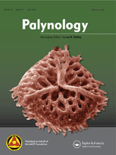
PALYNOLOGY
Illuminating Ecosystems of the Past with Cutting-Edge ResearchPALYNOLOGY, published by Taylor & Francis Inc in the United Kingdom, is a prominent academic journal focused on the field of paleontology, particularly the study of fossilized pollen and spores. Established in 1977, this journal continues to thrive, with comprehensive coverage of significant advancements and research findings in palynology, highlighting its integral role in understanding past ecosystems, climate changes, and evolutionary processes. With an impressive Scopus ranking of #34 out of 113 in the Earth and Planetary Sciences category, and a notable Q2 classification, PALYNOLOGY serves as a vital resource for researchers, professionals, and students committed to deepening their knowledge of paleontological studies. Although currently not Open Access, the journal remains dedicated to delivering valuable insights and fostering scholarly communication in the field, making it an essential read for anyone invested in the complexities of Earth’s biological history.
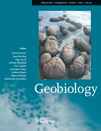
Geobiology
Connecting Biology and Geology for a Sustainable FutureGeobiology, published by WILEY, is a prestigious journal at the forefront of interdisciplinary research in Earth and Planetary Sciences, Ecology, and Environmental Science. With an ISSN of 1472-4677 and an E-ISSN of 1472-4669, this journal has achieved remarkable recognition as evidenced by its Q1 categorization in multiple relevant fields, including Earth and Planetary Sciences, Ecology, and Environmental Science, according to the 2023 quartile rankings. Covering a diverse range of topics from biogeochemical cycles to the impacts of climate change on biodiversity, Geobiology serves as a vital platform for researchers, professionals, and students alike. The journal boasts impressive Scopus rankings, placing it within the top tiers of its fields, which is indicative of its significant influence and contribution to advancing knowledge. Although it does not operate under an Open Access model, Geobiology ensures widespread reach and accessibility, allowing for impactful dialogues within the scientific community. Researchers are encouraged to submit their findings and engage with cutting-edge studies to advance our understanding of the interplay between biological and geological processes.
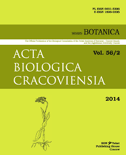
ACTA BIOLOGICA CRACOVIENSIA SERIES BOTANICA
Fostering a deeper understanding of our botanical heritage.ACTA BIOLOGICA CRACOVIENSIA SERIES BOTANICA is a distinguished journal published by the Polska Akademia Nauk (Polish Academy of Sciences), with its roots tracing back to 1996. As a pivotal publication in the field of Plant Science, it serves to disseminate high-quality research and findings, contributing to the ongoing development and understanding of biodiversity, plant ecology, and conservation. The journal is indexed under Scopus, ranked #203 out of 516 in its category, placing it in the 60th percentile and firmly within Q3 quartile for Plant Science in 2023. Researchers, professionals, and students will find invaluable content within its pages, enhancing their knowledge and supporting academic exploration. Although it currently does not offer open access options, the journal remains a crucial resource for those engaged in botanical sciences, with a commitment to advancing scholarship in Poland and beyond.

PALAEONTOGRAPHICA ABTEILUNG A-PALAOZOOLOGIE-STRATIGRAPHIE
Unveiling Earth's Past: Where Paleontology Meets StratigraphyPalaeontographica Abteilung A-Palaozoologie-Stratigraphie is a prominent academic journal that serves as a vital resource for researchers in the fields of Paleontology and Stratigraphy. Published by E Schweizerbart'sche Verlagsbuchhandlung in Germany, this journal has been instrumental in disseminating cutting-edge research from 1996 to 2024. With an established reputation highlighted by its Q3 ranking in both Paleontology and Stratigraphy, it ranks 26th among 113 journals in Paleontology and 15th among 55 in Stratigraphy, showcasing its significance within the scientific community. Although it does not currently offer open access, the journal provides an invaluable platform for the exchange of innovative ideas and findings in paleobiological and stratigraphic studies. As such, Palaeontographica continues to attract contributions from leading academics, making it an indispensable publication for professionals and students alike who are eager to advance their understanding of Earth's historical biological and geological patterns.
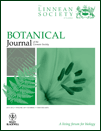
BOTANICAL JOURNAL OF THE LINNEAN SOCIETY
Connecting Scholars to the Heart of Plant ScienceThe Botanical Journal of the Linnean Society, published by Oxford University Press, stands as a premier platform for interdisciplinary research within the realms of Ecology, Evolution, Behavior, and Plant Science. With a notable impact factor reflective of its esteemed reputation, this journal is classified in the Q1 quartile for both Ecology and Plant Science, placing it among the most influential publications in these fields. Since its inception in 1969, and with an anticipated convergence of research extending to 2024, it has become essential for scholars and professionals seeking to engage with cutting-edge studies, theoretical frameworks, and practical applications that drive our understanding of plant biology and ecological systems. The journal’s commitment to excellence is underscored by its robust Scopus rankings—achieving an impressive 83rd percentile in Ecology and a 82nd percentile in Plant Science. This makes the Botanical Journal of the Linnean Society a crucial resource for researchers, educators, and students alike, eager to advance their knowledge and contribute to the evolving discourse in botany and environmental studies.